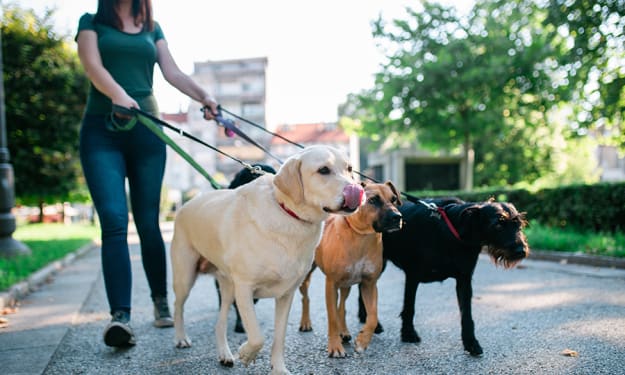How I Ride Horses for Free
Hint: It takes a lot of hard work.

I have always loved riding horses. The physical act of riding a horse is hard work, but so is taking care of one—feeding, grooming, stall cleaning, watering, sweeping, and more. As a broke post-graduate professional, I didn’t want to give up my love of horses, so I learned to work for free. Instead of leasing a horse and only being responsible for that animal, I spend countless hours at the barn taking care of horses—and other farm animals—that aren’t mine. I volunteer at a local animal rescue with horses, and while I am not paid for my time, I am compensated with free riding lessons and hack time. While most of my hours at the barn are not spent riding, the extra time and effort are well worth it for being able to spend time in the saddle.
When I was a kid, my parents paid for my riding lessons until I got a job as a teenager and paid for them myself. In college, I participated in the equestrian team. I paid for the first two years of the team, but the $900 a semester eventually became too expensive for me and my parents helped me out.
Then, I graduated college and was thrust into the real world. Unfortunately, I didn’t pick a lucrative career in journalism and I moved to one of the most expensive states in the U.S.—New York. So, with my rent gobblling up half of my income and bills, food and gas taking up a good portion of the rest, I don’t have much extra money left over at the end of the month.
If I wanted to stretch my budget thin as a horse's hair, I could half or quarter-lease a horse. But I want money to be able to travel to see my family, boyfriend, and college friends, all who are far away and take money to see. And I wanted to be able to do things with my new friends in New York. Not expensive things, but things—have a few drinks, go out to eat, go to a movie, go into New York City, etc.
So, I was left with the conundrum of still wanting to ride, but not really having much money to do it. I searched around for barns in the area that would let me work in exchange for catch-rides, or for barns that would pay me so I could use the extra income on leasing or lessons. By some stroke of serendipity, I came across an animal rescue only ten minutes from my apartment and decided to take a visit.
While I noticed right away this wasn’t the heavily-funded, posh barn I was used to in college, the animals were healthy and well taken care of. The first day I arrived, the barn owner was shearing her alpacas, and I was told to stuff the alpaca’s wool into feed bags as it came off the animal. I don’t have much experience with farm animals other than horses, so it was an interesting first assignment.
The barn owner said she wanted to see if I could work before I could ride her horses. And since then, I’ve done a lot of hard work—grooming horses, cleaning their hooves, sweeping, cleaning stalls, leading trail rides, feeding and more. But, in exchange for two mornings of work a week, one evening a week and one weekend day, I can ride about twice a week, depending on my schedule.
While I do work about 40 hours a week, my work schedule is flexible, so I’m able to go into the office an hour or two later on the mornings that I work at the barn. I realize this is a luxury most working Americans don’t have, and it’s a luxury I’m grateful for. I also realize I’m fortunate to find a barn so close to my apartment, where I can spend time late into the evening without having to worry about a long commute home.
Of course, I wouldn’t be able to ride without having to work. I could lease a horse and not have to work so much, instead just showing up to groom and ride and clean the horses’ stall, but then I would be stretching myself financially thin.
For the first time in my riding career, I’m able to ride the same horse most of the time and see the results of my hard work. Most of my riding career has been spent rotating through lesson horses, so I’m grateful to be able to get better and better working consistently with one horse.
So, being able to ride means hard work, both on and off the horse. The extra work is well worth it to be able to continue doing what I love.
About the Creator
Laura Fitzgerald
Newspaper journalist that loves writing, people, travel and horses.






Comments
There are no comments for this story
Be the first to respond and start the conversation.